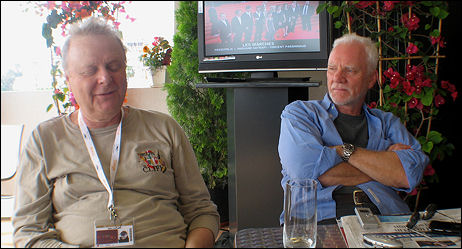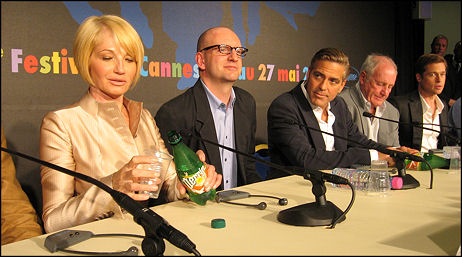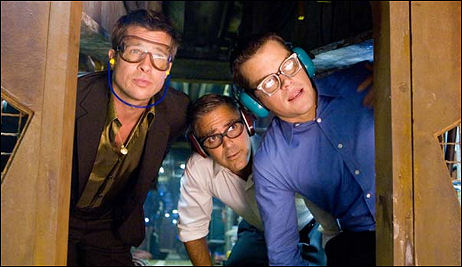My ten days of trying to cover the hard-slamming Cannes Film Festival, which has always involved 18-hour work days broken up by sleep periods of five or six hours, has wound to a close, even though the festival will continue for another three days including today — Friday, 5.15. I’ve been hanging with Jett, who reviewed and covered for the Boston Pheonix online for the last six days, and this morning we’re pushing on to Italy for a few days. I’ll still do my daily filing, but from a somewhat more tranquil head-space. I did and saw many things during the festival that I haven’t yet gotten into, so…
Day: May 24, 2007
McCarthy on “The Man From London”
Bella Tarr‘s very slow-moving The Man From London, a Cannes entry, “epitomized what is known as a ‘festival film,’ i.e., one made for no known audience apart from the already converted disciples of a cult director,” Variety‘s Todd McCarthy has observed. “One version of hell for me would consist of being trapped inside the insular world of this film for eternity.”
“We Own The Night”
I was hoping for something much sharper and smarter from James Gray‘s We Own The Night, which showed at the Cannes Film Festival on Thursday, and which Columbia will be releasing stateside sometime later this year. It’s a slam-bang urban action piece by way of a Brooklyn family-ties melodrama. It’s good to see Gray back on his feet after years in movie jail (his last film was The Yards, which opened seven years ago) but this is too often a crude, unsubtle, difficult-to-digest film.

I’m going to say right now that there’s a mild spoiler or two in this piece.
The most recent high-water marks for family crime films, in my book, are The Sopranos on HBO and The Departed. Gray’s film is nowhere near this league. As vigorous and heated as Night obviously is (the two most thrilling scenes are an invasion of a Russian-mafia cocaine apartment and a car chase/attack scene in the driving rain), the writing is thick and pulp. The story felt imposed upon the characters rather than characters driving the story. I kept getting the feeling that the dialogue wasn’t quite there on the page so the actors were improvising all through it.
A “friend” of the film argues that “what [they] were going for was an archetypal throwback to ’70s filmmaking rather than the more complex literariness of The Sopranos. This is not a ‘modern√ɬ¢√¢‚Äö¬¨√Ǭù film’ — it has no meta-commentary going on, and has no literary aspirations. The Departed was complex to a fault (there are several scenes toward the end of that movie that make no sense, but no one cares because it√ɬ¢√¢‚Äö¬¨√¢‚Äû¬¢s so fun.”
I got into a friendly debate yesterday with this guy, so here’s a list of my quibbles along with his counter-arguments:
Joaquin Pheonix‘s Bobby — a nightclub owner-manager in denial about his familial affinities to a tribe of New York cops, including a hard-nosed detective brother (Mark Wahlberg) and an equally hard-nosed dad (Robert Duvall) — is highly dislikable for the way he refuses to let girlfriend Eva Mendes be involved with anything important– he seems to just wants to fuck her when they’re alone and that’s it.
Counterpoint: “You didn√ɬ¢√¢‚Äö¬¨√¢‚Äû¬¢t get the impression that Bobby really loved Amanda but knew that his family (who are quasi-racist, remember) would never let her into the fold because she’s a party girl? Bobby sort of knows deep down she’s just not constitutionally able to be a cop√ɬ¢√¢‚Äö¬¨√¢‚Äû¬¢s wife.”
Would the wounded Wahlberg, admitted hours earlier into a hospital for bullet wounds, have blood oozing out of his cheek and his hair? Don’t hospital staffers constantly dress wounds to keep everything as sterile and germ-free as possible?
Counterpoint: “Wahlberg√ɬ¢√¢‚Äö¬¨√¢‚Äû¬¢s post-gunshot look is absolutely real. [The filmmakers] did a ton of research — there was a doctor who worked in ICU in the 80s advising. But if it doesn√ɬ¢√¢‚Äö¬¨√¢‚Äû¬¢t play. it doesn√ɬ¢√¢‚Äö¬¨√¢‚Äû¬¢t play.”
I know Pheonix has been keeping his family ties a secret in the beginning, but would the Russian mob guys be so stupid as to not have a clue that Wahlberg is his brother?
Counterpoint: “This is the pre-internet age” — Night is set in 1988 — “when people could absolutely keep their familial connections at arm√ɬ¢√¢‚Äö¬¨√¢‚Äû¬¢s length. In fact, James based Bobby√ɬ¢√¢‚Äö¬¨√¢‚Äû¬¢s character on a real guy who hid his cop connections. Remember also that he had worked is way up from bartender to manager so there would be zero suspicion. Also, the Russians weren√ɬ¢√¢‚Äö¬¨√¢‚Äû¬¢t cunning — they were just brutally violent.”
“Would Jumbo, the big tough guy who excels at beating other guys up, really collapse and start weeping like that when Pheonix starts to lean on him, and when the cops grill him?”
CounterpointVadim Nezhinski — what is that, some kind of perverse mirror-image identity of Njinsky, the famed ballet dancer? The movie is full of little “what the fuck?” irritants.
Counterpoint: “I think the fact that these details irritated you is a sign that you just did not buy into the more operatic core emotions this movie is selling.
“Those critics for whom the movie is properly positioned I think will appreciate the movie√ɬ¢√¢‚Äö¬¨√¢‚Äû¬¢s lack of irony and gratuitous hyper-reality. This is a very basic story where a lot of the emotions are laid bare. We are hoping that because of the car chase, the overall level of detail, and the deliberateness, critics will key in to the Friedkin/Visconti reference points and not judge the movie against a winking movie like The Departed, which I think sometimes gets confused with √ɬ¢√¢‚Äö¬¨√ã≈ìsmartness√ɬ¢√¢‚Äö¬¨√¢‚Äû¬¢ and √ɬ¢√¢‚Äö¬¨√ã≈ìsharpness√ɬ¢√¢‚Äö¬¨√¢‚Äû¬¢ but can sometimes exist in an emotional vacuum.
“The most ironic thing of all is that in research screenings The Departed never tested above a 65 (top two boxes — excellent and very good) whereas We Own The Night has tested in the high 80s. So [the team is] definitely confident about word of mouth. Good Night and Good Luck tested at 48; Monsters Ball got a 23 (norms are about 65); In The Bedroom at 25. And then reviewers told audiences those movies were brilliant so they wound up with great exit polls and word-of-mouth. Sheep…”
“Butterfly” for Miramax
Miramax Films has acquired Julian Schnabel‘s The Diving Bell and the Butterfly, a beautifully made, French-language film that inspires guilty thoughts of escape. Variety is reporting that the distributor paid “midway between $2 million and $3 million for North American rights.” People of taste will go, but Miramax has its work cut out.
Kaplan-McDowell
Here’s a recording of a chat I had yesterday afternoon with Malcolm McDowell and producer-director Mike Kaplan about their documentary, Never Apologize, which is basically a capturing of a one-man show that McDowell performed in Ojai not long ago about his long, warm, nurturing relationship with director Lindsay Anderson, who directed McDowell in If…, O Lucky Man! and Brittania Hospital. I have to get in line for a 7 pm showng of James Gray‘s We Own The Night, but I’ll share a few comments about the film tomorrow.

“Ocean’s” press conference
One of the pithier comments from this afternoon’s Ocean’s Thirteen press conference came from star George Clooney when he responded to a far-too-serious inquiry about the declining state of screen- writing. “I’m so glad you asked that question about this film,” he replied, adding that Ocean’s Thirteen was “clearly a cry for peace.”

Ocean’s Thirteen-ers at this afternoon’s press conference (l. to r.) Ellen Barkin, Steven Soderbergh, George Clooney, producer Jerry Weintraub, Brad Pitt — Thursday, 5.24.07, 2:32 pm
I asked towards the end of the session if it was fair to compare this revenge film (i.e., about a group of rakish, rascally guys ripping off a powerful, arrogant blue-chip thug) with the last big studio film that succeeded really well with this kind of yarn — i.e., The Sting. And if it’s fair to compare the two, how would Soderbergh & Co. reply? “We’re not going there,” producer Jerry Weintraub said.
Kehr on Cannes contenders
“The head’s-on favorite to win the Cannes Filjm Festival’s Palme d’Or, at least to judge from the critics’ poll published by Le Film Francais, appears to be the Coen Brothers‘ No Country for Old Men. It’s the one film that’s attracting support from both the highbrow critics (Positif, Les Inrocks, Le Monde) and the more popular press (Studio, L’Express, Le Point, Premiere).” — from Dave Kehr‘s analysis on www.davekehr.com.
Support for Julian Schnabel‘s The Diving Bell and the Butterfly is definitely being heard up and down the Croisette, but there are those, also, who feel as I did. Butterfly delivers a stirring theme and has been directed with invention and assurance, but at the same time it makes you feel just as trapped as former Elle editor Jean-Dominique Bauby (Mathieu Amalric), who can’t move or express anything except with the blinking of his left eye. I was saying two things to myself as I watched it: (1) “This is a very sensitive and beautiful film” and (b) “Let me out!”
Amalric will probably win the Best Actor award, though.
Keep Him That Way
A “very trusted” source has told Collider‘s Steve Weintraub that producer Jerry Bruckheimer wants to bring back The Lone Ranger and that he’s going to enlist his Pirates crew to make it happen. If true, this is an obvious non-starter for the simple fact that westerns haven’t mattered for decades. What’s this going to be, The Wild Wild West with virtue? I know, I know — it’s easy for someone like me to take potshots, but if this film comes to pass, you know it isn’t going to be Open Range. Better idea for Jerry & Co.: remake Shane.
“Ocean’s Thirteen”
Sorry to be the bearer, but Ocean’s Thirteen (Warner Bros., 6.8) is nothing to drop your socks for or go “hell, yeah!” about. I just came out of the 11 a.m. Cannes press screening, and my reaction was that flat-hand gesture where you kind of wiggle it and go “okay, yeah… meh.”

No journalist I’ve spoken to thus far is doing cartwheels over this thing. No, take that back — one major-publication guy thought it was better than Ocean’s Twelve. But then I have fairly skewed tastes (I found the Julia-Roberts-pretending-to-be-Julia Roberts bit in that Rome hotel hilarious), so maybe the mainstreamers who derive a part-of-the-crowd comfort from the mere act of watching a big-studio franchise movie (the content being another matter entirely) will get off on it.
Update: Here’s Todd McCarthy‘s Variety review, which is pretty favorable.
I didn’t hate Ocean’s Thirteen — I smiled at times and came out shrugging. It rolls along and gets fairly intricate at times and does the expected rabbit-trick thing. But the first half is on the boring side. (Saying that something “is on the boring side” is a chickenshit way of saying it’s boring.) Set-up, set-up…exposition, exposition. No real juice or laughs early on — only mild amusement.
The second half is “fun” here and there (there’s a total dropout moment when Clooney and Brad Pitt‘s character stop for a second to watch a house giveaway on Oprah and…okay, no spoilers) but, as a friend just wrote, “it doesn’t remotely make-up for the failure of the first [half].”
This being a revenge story, you obviously have to compare it The Sting. It wold be derelict not to. And in terms of enjoyment, charm, great bits, laughs, snappy dialogue, tension-suspense and fakeout moves, it doesn’t even come close. I wish it were otherwise. This is not to say that Steven Soderbergh‘s third (and hopefully last) Ocean’s film stinks. It doesn’t, but the overall after-vibe is one of those lukewarm deals.
How good is Al Pacino‘s Willie Banks, the Robert Shaw/Doyle Lonnegan of the piece? The part isn’t really there in terms of depth or pizazz, so Pacino doesn’t have much to play. Ellen Barkin plays Pacino’s right-hand assistant, and ..well, she’s spirited. You know how the other guys are.
I’m sitting in the Salle du Presse waiting for George Clooney and the gang to show up (the festival goons let the journalists in 45 minutes ago, and the Thirteen crew won’t show for another 20 minutes) minutes from now!).
“Why the hell did they need to do this one?” a friend just asked me. To make money, obviously, and to help keep the Soderbergh-coolness ball in the air and to balance out the losses of his little arty films. That’s a fair and necessary equation, and for the sake of this I hope Ocean’s Thirteen does as well as the first two.
